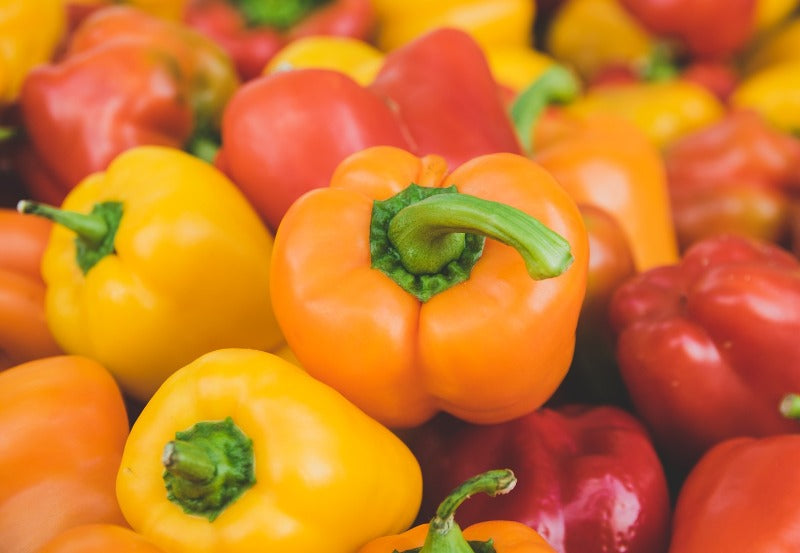Bell peppers are a colorful way to add nutrients and flavor to your diet. You might want to share this vegetable with your beardie, too. Let’s look at the nutritional info to answer the question: Can bearded dragons eat bell peppers?
Can Bearded Dragons Eat Peppers?
The quick answer is yes, bearded dragons can eat bell peppers. Can they be eaten every day? No. Bearded dragons can eat bell peppers a few times a week or less.
Bearded dragons can get the following nutrients from bell peppers:
- Antioxidants, which prevent inflammation, strengthen the immune system, and aid digestion
- Vitamins A and C, which boost the immune system, vision, reproduction, and growth
- Vitamin B6, which helps create red blood cells
- Vitamin E, which prevents inflammation and builds up damaged cells
- Vitamin K1, which assists in blood clotting and bone strength
- Folate, which helps keep cells and tissue healthy
- Potassium, which is key for heart health
Bearded dragons can also be hydrated with bell peppers because of their high water content. Red bell peppers contain the most water, at 92%. Just be cautious not to over-hydrate with bell peppers, or your beardie will soon have diarrhea from overhydration, which can lead to dehydration from the diarrhea—a vicious cycle.

Why Can't Bearded Dragons Eat Bell Peppers As A Staple?
On the flip side, bell peppers are not perfect vegetables for bearded dragons. Here are the reasons they cannot be a staple vegetable:
Not much calcium. Bell peppers are a poor source of calcium. Bearded dragons need staple vegetables that provide this vital nutrient. If a vegetable is nutrient-dense in other areas but not in calcium, the vegetable can be a good option as a salad mixer but not a daily staple. That’s how it is with bell peppers: they offer some excellent benefits for bearded dragons, but they don’t have enough calcium to be worth eating every day.
Poor calcium to phosphorus ratio. In addition to having little calcium, bell peppers have about twice the amount of phosphorus as calcium. When bearded dragons eat too many phosphorus-rich foods without sufficient calcium, they can develop metabolic bone disease.
Lack of calcium (and/or lack of vitamin D3, which is necessary for calcium absorption) is the top cause of metabolic bone disease (MBD) in bearded dragons. Too much phosphorus can cause MBD because it binds with calcium to prevent absorption and deplete the bearded dragon’s calcium supply.
MBD is one of the most common health disorders among domesticated bearded dragons. The disease is painful as well as debilitating because it attacks the dragon’s skeletal system, causing paralysis and warped limbs. However, MBD is easily preventable with wise diet choices and proper calcium supplementation.
Pro Tip: To optimize your bearded dragon’s nutritional intake and prevent metabolic bone disease, dust your dragon’s live food with a calcium and Vitamin D3 mix.
Vitamin A overload. Bell peppers are famously full of Vitamin A. This is a wonderful perk since bearded dragons need Vitamin A to help them see, reproduce, and grow well. At the same time, some bearded dragons who are taking Vitamin A supplements can develop hypervitaminosis A (overdose of Vitamin A or Vitamin A toxicity), which presents itself through symptoms like swelling, lethargy, and weight loss.
The risk of hypervitaminosis A is not too high, but it’s worth mentioning, especially for bearded dragons who take Vitamin A supplements or consume a lot of Vitamin A-rich foods. If that’s the case, you may want to limit peppers or consult with your vet before feeding them (especially red peppers, which have the most Vitamin A).
Can Bearded Dragons Eat Green Peppers?
Green bell peppers are actually unripe yellow or red bell peppers. Because green bell peppers are underdeveloped, so to speak, they have less nutritional content than yellow and red peppers.

Red bell peppers, for example, have far more Vitamin A and C than green bell peppers. That doesn’t necessarily mean that green bell peppers are not good for your bearded dragon, it just means that red and yellow peppers are more nutritionally dense.
Still, bearded dragons can safely eat green bell peppers. They just need to eat them in moderation. What color pepper you choose ultimately depends on your goals with feeding bell peppers. If your dragon seriously needs more of the nutrients that yellow and red peppers have to offer, then that would be a better choice than green.
But if you are just trying to vary your dragon’s veggie menu, green could be a better way to go. At the end of the day, it’s up to you to decide what works best for your dragon. To make things fun, you could always feed a little bit of each pepper to your dragon and figure out his favorite flavor (maybe he’ll love all three—or four if you add orange peppers into the mix!).
Can Bearded Dragons Eat Red Peppers?
All bell peppers carry quite a lot of important nutrients, but red bell peppers are the most nutritious because they are fully ripened. Bearded dragons can eat red bell peppers (and all colors of bell peppers). Just not every day.
How Can Bearded Dragons Eat Bell Peppers?
Here are some tips to keep in mind when serving bell peppers to your bearded dragon:
- Choose an organic bell pepper when possible.
- Wash the bell pepper thoroughly even if it’s organic.
- Remove the pepper top, membranes, and seeds.
- Slice the outer shell of the pepper into very small pieces and feed with your beardie’s salad or alone.
Wondering what other vegetables to serve with bell peppers? Try sprinkling pepper pieces on a bed of kale, perhaps with some small chunks of acorn squash and a garnish of raspberries. Get creative and see what combinations your beardie likes best!
Got questions or feedback? Please email us at team@dragonsdiet.com








